Analysis of Leadership and Management at Sainsbury's: A Report
VerifiedAdded on 2023/01/11
|14
|4012
|71
Report
AI Summary
This report provides a comprehensive analysis of leadership and management within the context of Sainsbury's operations. It begins by defining and comparing the traits and roles of leaders and managers, differentiating their functions using various theories, such as contingency and situational leadership. The report explores how these roles apply in different situations, including recruitment and change management, and evaluates the strengths and weaknesses of different approaches. Part 2 delves into how managers and leaders can improve operational management efficiencies, examining approaches like Six Sigma and Total Quality Management (TQM). The report highlights the importance of operations management, factors related to Corporate Social Responsibility (CSR), and the impact of different elements on the wider community and business environment, offering a critical evaluation of the application of operations management and related factors. It concludes with recommendations for enhancing leadership and management practices at Sainsbury's, supported by references to relevant literature.
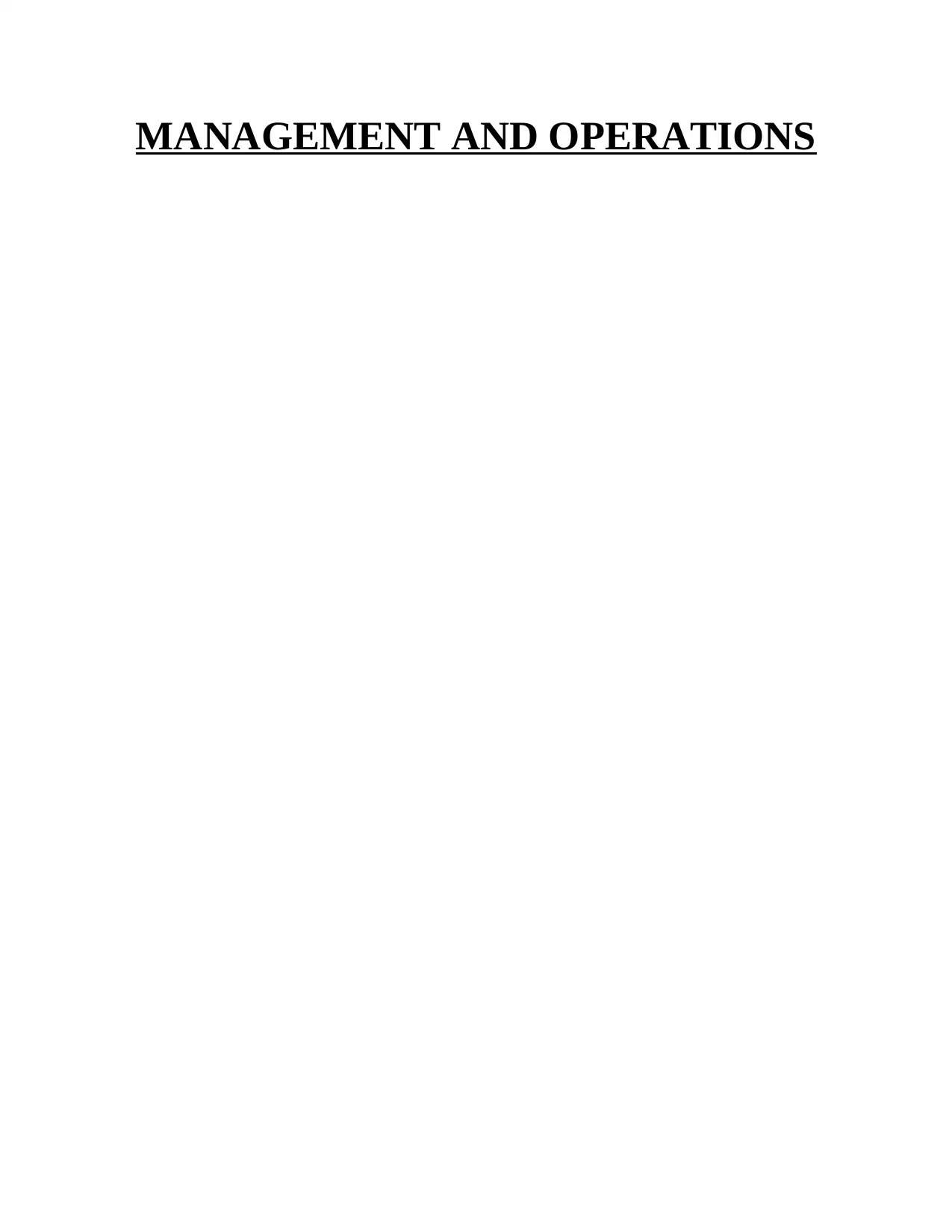
MANAGEMENT AND OPERATIONS
Paraphrase This Document
Need a fresh take? Get an instant paraphrase of this document with our AI Paraphraser
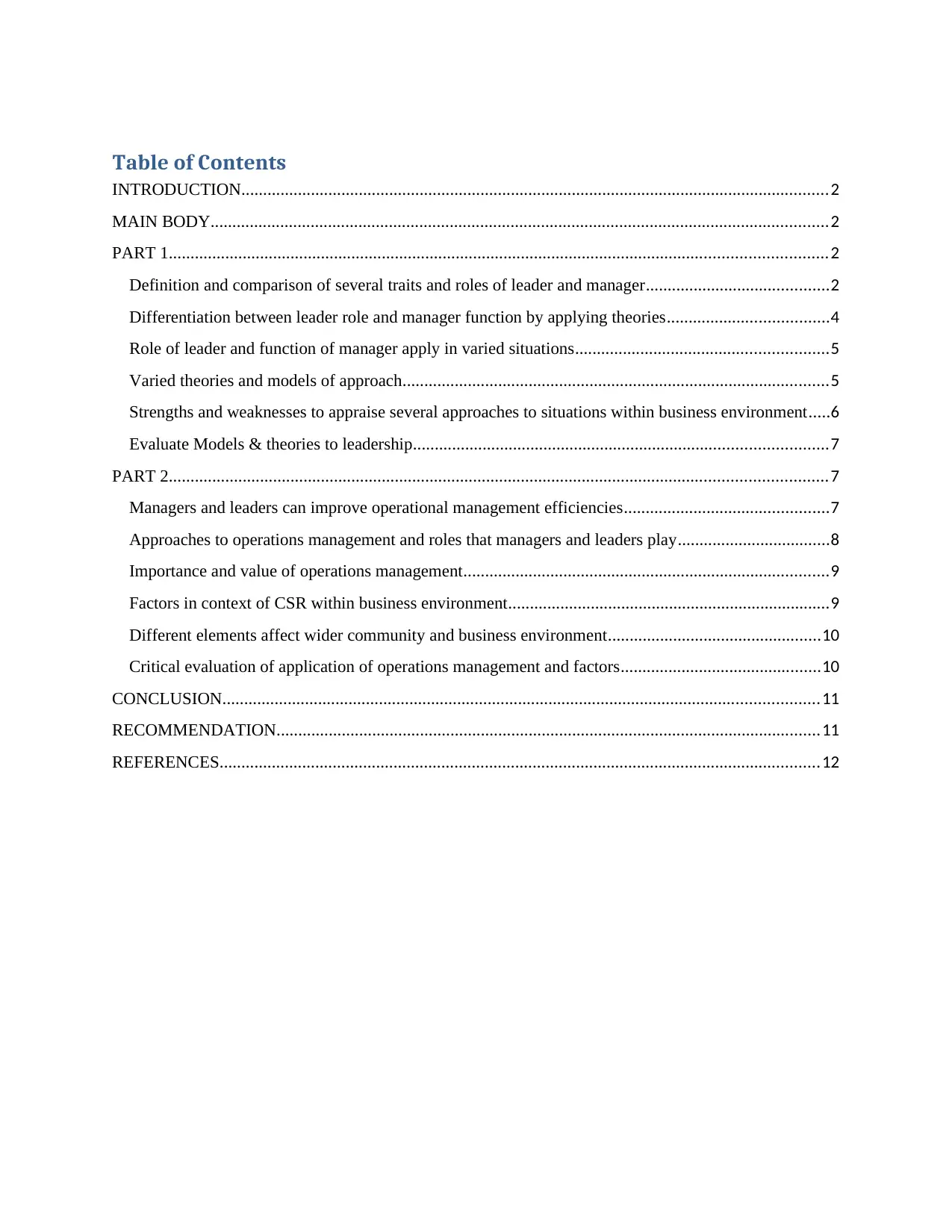
Table of Contents
INTRODUCTION.......................................................................................................................................2
MAIN BODY..............................................................................................................................................2
PART 1.......................................................................................................................................................2
Definition and comparison of several traits and roles of leader and manager..........................................2
Differentiation between leader role and manager function by applying theories.....................................4
Role of leader and function of manager apply in varied situations..........................................................5
Varied theories and models of approach..................................................................................................5
Strengths and weaknesses to appraise several approaches to situations within business environment.....6
Evaluate Models & theories to leadership...............................................................................................7
PART 2.......................................................................................................................................................7
Managers and leaders can improve operational management efficiencies...............................................7
Approaches to operations management and roles that managers and leaders play...................................8
Importance and value of operations management....................................................................................9
Factors in context of CSR within business environment..........................................................................9
Different elements affect wider community and business environment.................................................10
Critical evaluation of application of operations management and factors..............................................10
CONCLUSION.........................................................................................................................................11
RECOMMENDATION.............................................................................................................................11
REFERENCES..........................................................................................................................................12
INTRODUCTION.......................................................................................................................................2
MAIN BODY..............................................................................................................................................2
PART 1.......................................................................................................................................................2
Definition and comparison of several traits and roles of leader and manager..........................................2
Differentiation between leader role and manager function by applying theories.....................................4
Role of leader and function of manager apply in varied situations..........................................................5
Varied theories and models of approach..................................................................................................5
Strengths and weaknesses to appraise several approaches to situations within business environment.....6
Evaluate Models & theories to leadership...............................................................................................7
PART 2.......................................................................................................................................................7
Managers and leaders can improve operational management efficiencies...............................................7
Approaches to operations management and roles that managers and leaders play...................................8
Importance and value of operations management....................................................................................9
Factors in context of CSR within business environment..........................................................................9
Different elements affect wider community and business environment.................................................10
Critical evaluation of application of operations management and factors..............................................10
CONCLUSION.........................................................................................................................................11
RECOMMENDATION.............................................................................................................................11
REFERENCES..........................................................................................................................................12
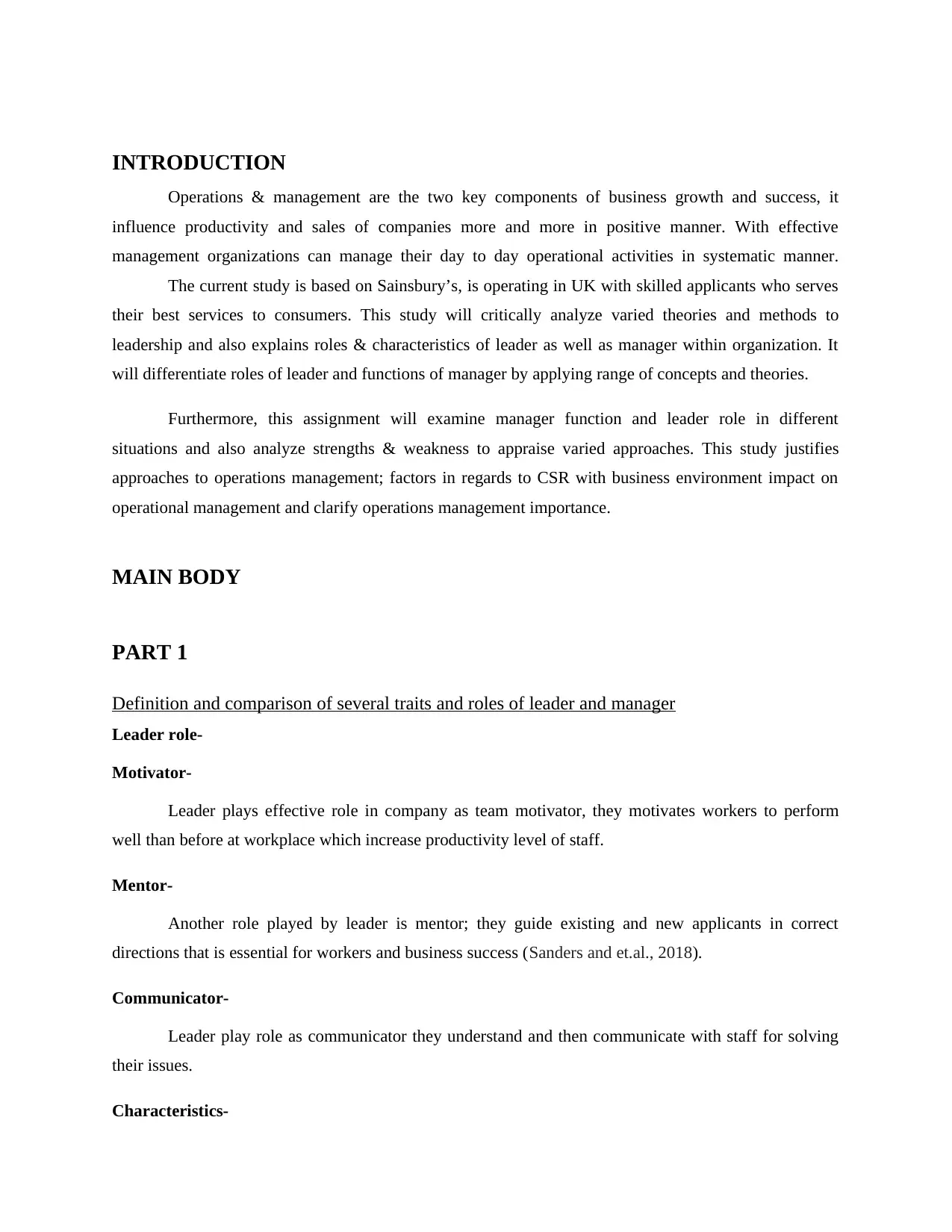
INTRODUCTION
Operations & management are the two key components of business growth and success, it
influence productivity and sales of companies more and more in positive manner. With effective
management organizations can manage their day to day operational activities in systematic manner.
The current study is based on Sainsbury’s, is operating in UK with skilled applicants who serves
their best services to consumers. This study will critically analyze varied theories and methods to
leadership and also explains roles & characteristics of leader as well as manager within organization. It
will differentiate roles of leader and functions of manager by applying range of concepts and theories.
Furthermore, this assignment will examine manager function and leader role in different
situations and also analyze strengths & weakness to appraise varied approaches. This study justifies
approaches to operations management; factors in regards to CSR with business environment impact on
operational management and clarify operations management importance.
MAIN BODY
PART 1
Definition and comparison of several traits and roles of leader and manager
Leader role-
Motivator-
Leader plays effective role in company as team motivator, they motivates workers to perform
well than before at workplace which increase productivity level of staff.
Mentor-
Another role played by leader is mentor; they guide existing and new applicants in correct
directions that is essential for workers and business success (Sanders and et.al., 2018).
Communicator-
Leader play role as communicator they understand and then communicate with staff for solving
their issues.
Characteristics-
Operations & management are the two key components of business growth and success, it
influence productivity and sales of companies more and more in positive manner. With effective
management organizations can manage their day to day operational activities in systematic manner.
The current study is based on Sainsbury’s, is operating in UK with skilled applicants who serves
their best services to consumers. This study will critically analyze varied theories and methods to
leadership and also explains roles & characteristics of leader as well as manager within organization. It
will differentiate roles of leader and functions of manager by applying range of concepts and theories.
Furthermore, this assignment will examine manager function and leader role in different
situations and also analyze strengths & weakness to appraise varied approaches. This study justifies
approaches to operations management; factors in regards to CSR with business environment impact on
operational management and clarify operations management importance.
MAIN BODY
PART 1
Definition and comparison of several traits and roles of leader and manager
Leader role-
Motivator-
Leader plays effective role in company as team motivator, they motivates workers to perform
well than before at workplace which increase productivity level of staff.
Mentor-
Another role played by leader is mentor; they guide existing and new applicants in correct
directions that is essential for workers and business success (Sanders and et.al., 2018).
Communicator-
Leader play role as communicator they understand and then communicate with staff for solving
their issues.
Characteristics-
⊘ This is a preview!⊘
Do you want full access?
Subscribe today to unlock all pages.

Trusted by 1+ million students worldwide
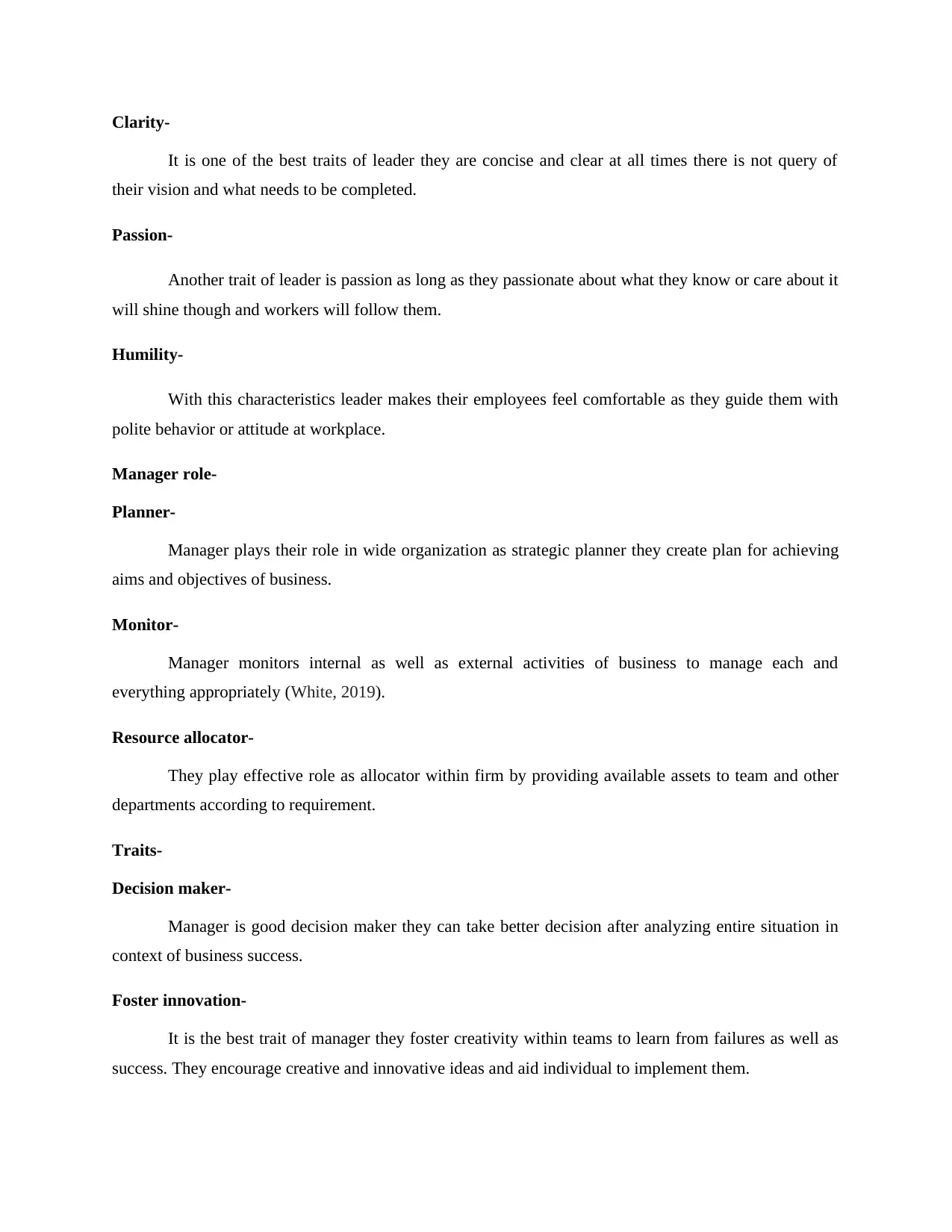
Clarity-
It is one of the best traits of leader they are concise and clear at all times there is not query of
their vision and what needs to be completed.
Passion-
Another trait of leader is passion as long as they passionate about what they know or care about it
will shine though and workers will follow them.
Humility-
With this characteristics leader makes their employees feel comfortable as they guide them with
polite behavior or attitude at workplace.
Manager role-
Planner-
Manager plays their role in wide organization as strategic planner they create plan for achieving
aims and objectives of business.
Monitor-
Manager monitors internal as well as external activities of business to manage each and
everything appropriately (White, 2019).
Resource allocator-
They play effective role as allocator within firm by providing available assets to team and other
departments according to requirement.
Traits-
Decision maker-
Manager is good decision maker they can take better decision after analyzing entire situation in
context of business success.
Foster innovation-
It is the best trait of manager they foster creativity within teams to learn from failures as well as
success. They encourage creative and innovative ideas and aid individual to implement them.
It is one of the best traits of leader they are concise and clear at all times there is not query of
their vision and what needs to be completed.
Passion-
Another trait of leader is passion as long as they passionate about what they know or care about it
will shine though and workers will follow them.
Humility-
With this characteristics leader makes their employees feel comfortable as they guide them with
polite behavior or attitude at workplace.
Manager role-
Planner-
Manager plays their role in wide organization as strategic planner they create plan for achieving
aims and objectives of business.
Monitor-
Manager monitors internal as well as external activities of business to manage each and
everything appropriately (White, 2019).
Resource allocator-
They play effective role as allocator within firm by providing available assets to team and other
departments according to requirement.
Traits-
Decision maker-
Manager is good decision maker they can take better decision after analyzing entire situation in
context of business success.
Foster innovation-
It is the best trait of manager they foster creativity within teams to learn from failures as well as
success. They encourage creative and innovative ideas and aid individual to implement them.
Paraphrase This Document
Need a fresh take? Get an instant paraphrase of this document with our AI Paraphraser
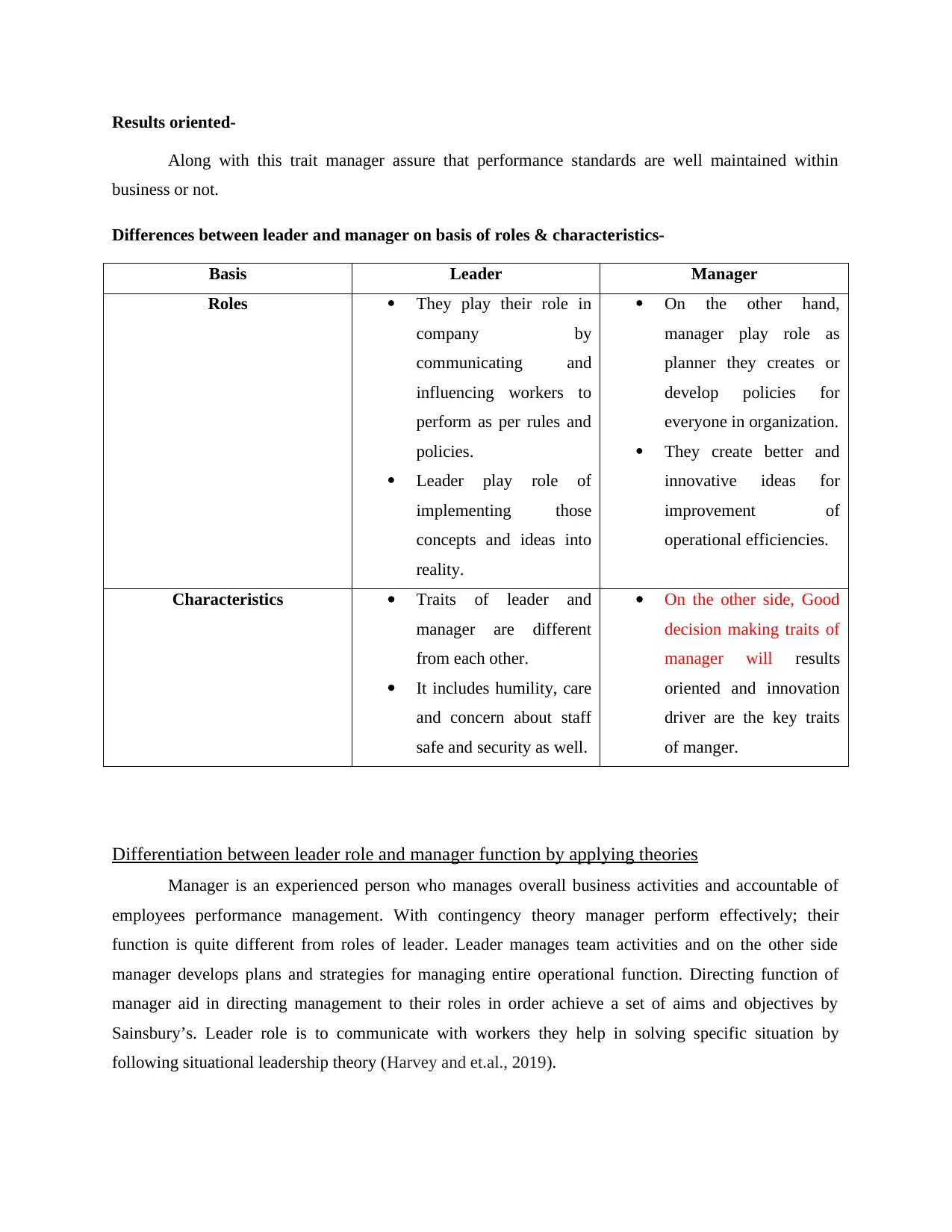
Results oriented-
Along with this trait manager assure that performance standards are well maintained within
business or not.
Differences between leader and manager on basis of roles & characteristics-
Basis Leader Manager
Roles They play their role in
company by
communicating and
influencing workers to
perform as per rules and
policies.
Leader play role of
implementing those
concepts and ideas into
reality.
On the other hand,
manager play role as
planner they creates or
develop policies for
everyone in organization.
They create better and
innovative ideas for
improvement of
operational efficiencies.
Characteristics Traits of leader and
manager are different
from each other.
It includes humility, care
and concern about staff
safe and security as well.
On the other side, Good
decision making traits of
manager will results
oriented and innovation
driver are the key traits
of manger.
Differentiation between leader role and manager function by applying theories
Manager is an experienced person who manages overall business activities and accountable of
employees performance management. With contingency theory manager perform effectively; their
function is quite different from roles of leader. Leader manages team activities and on the other side
manager develops plans and strategies for managing entire operational function. Directing function of
manager aid in directing management to their roles in order achieve a set of aims and objectives by
Sainsbury’s. Leader role is to communicate with workers they help in solving specific situation by
following situational leadership theory (Harvey and et.al., 2019).
Along with this trait manager assure that performance standards are well maintained within
business or not.
Differences between leader and manager on basis of roles & characteristics-
Basis Leader Manager
Roles They play their role in
company by
communicating and
influencing workers to
perform as per rules and
policies.
Leader play role of
implementing those
concepts and ideas into
reality.
On the other hand,
manager play role as
planner they creates or
develop policies for
everyone in organization.
They create better and
innovative ideas for
improvement of
operational efficiencies.
Characteristics Traits of leader and
manager are different
from each other.
It includes humility, care
and concern about staff
safe and security as well.
On the other side, Good
decision making traits of
manager will results
oriented and innovation
driver are the key traits
of manger.
Differentiation between leader role and manager function by applying theories
Manager is an experienced person who manages overall business activities and accountable of
employees performance management. With contingency theory manager perform effectively; their
function is quite different from roles of leader. Leader manages team activities and on the other side
manager develops plans and strategies for managing entire operational function. Directing function of
manager aid in directing management to their roles in order achieve a set of aims and objectives by
Sainsbury’s. Leader role is to communicate with workers they help in solving specific situation by
following situational leadership theory (Harvey and et.al., 2019).
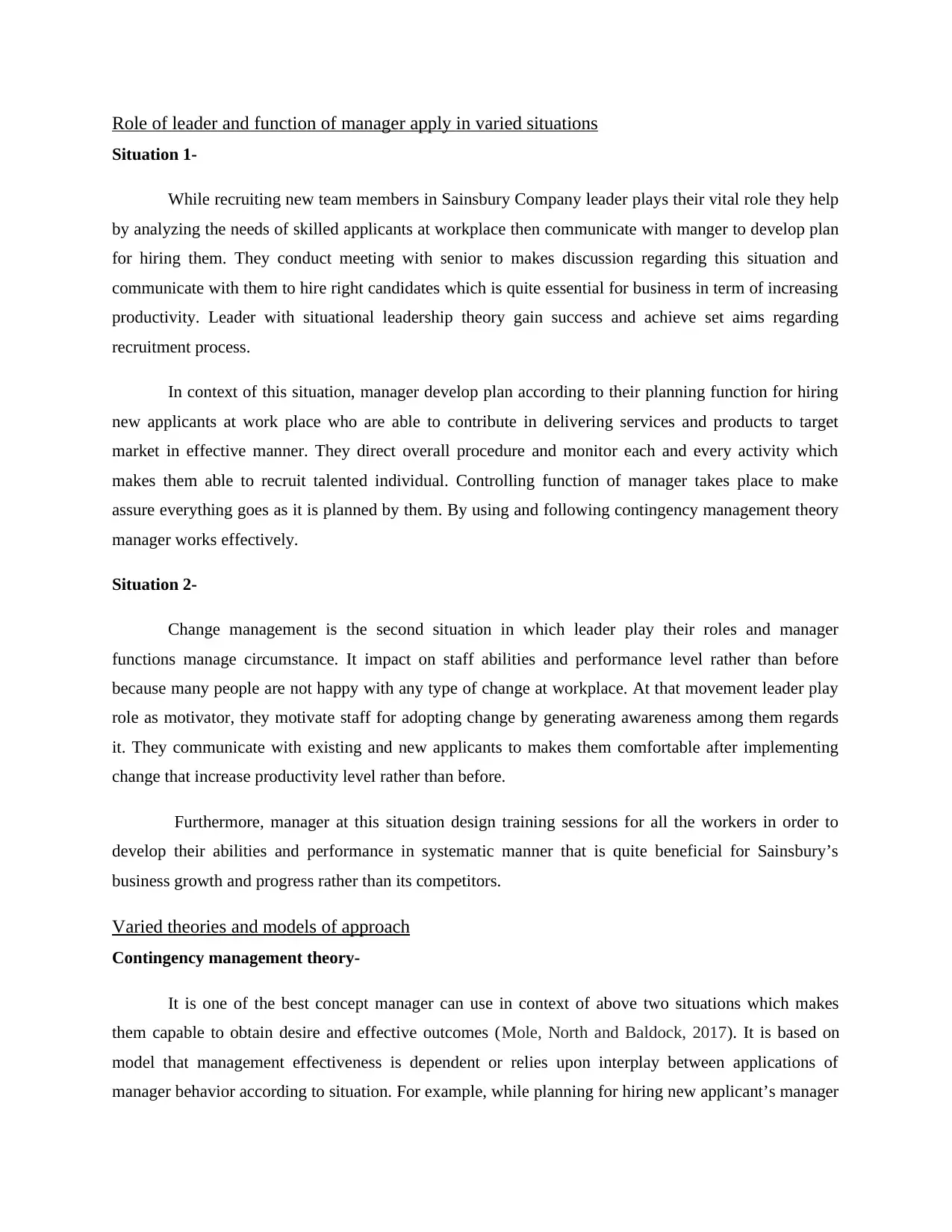
Role of leader and function of manager apply in varied situations
Situation 1-
While recruiting new team members in Sainsbury Company leader plays their vital role they help
by analyzing the needs of skilled applicants at workplace then communicate with manger to develop plan
for hiring them. They conduct meeting with senior to makes discussion regarding this situation and
communicate with them to hire right candidates which is quite essential for business in term of increasing
productivity. Leader with situational leadership theory gain success and achieve set aims regarding
recruitment process.
In context of this situation, manager develop plan according to their planning function for hiring
new applicants at work place who are able to contribute in delivering services and products to target
market in effective manner. They direct overall procedure and monitor each and every activity which
makes them able to recruit talented individual. Controlling function of manager takes place to make
assure everything goes as it is planned by them. By using and following contingency management theory
manager works effectively.
Situation 2-
Change management is the second situation in which leader play their roles and manager
functions manage circumstance. It impact on staff abilities and performance level rather than before
because many people are not happy with any type of change at workplace. At that movement leader play
role as motivator, they motivate staff for adopting change by generating awareness among them regards
it. They communicate with existing and new applicants to makes them comfortable after implementing
change that increase productivity level rather than before.
Furthermore, manager at this situation design training sessions for all the workers in order to
develop their abilities and performance in systematic manner that is quite beneficial for Sainsbury’s
business growth and progress rather than its competitors.
Varied theories and models of approach
Contingency management theory-
It is one of the best concept manager can use in context of above two situations which makes
them capable to obtain desire and effective outcomes (Mole, North and Baldock, 2017). It is based on
model that management effectiveness is dependent or relies upon interplay between applications of
manager behavior according to situation. For example, while planning for hiring new applicant’s manager
Situation 1-
While recruiting new team members in Sainsbury Company leader plays their vital role they help
by analyzing the needs of skilled applicants at workplace then communicate with manger to develop plan
for hiring them. They conduct meeting with senior to makes discussion regarding this situation and
communicate with them to hire right candidates which is quite essential for business in term of increasing
productivity. Leader with situational leadership theory gain success and achieve set aims regarding
recruitment process.
In context of this situation, manager develop plan according to their planning function for hiring
new applicants at work place who are able to contribute in delivering services and products to target
market in effective manner. They direct overall procedure and monitor each and every activity which
makes them able to recruit talented individual. Controlling function of manager takes place to make
assure everything goes as it is planned by them. By using and following contingency management theory
manager works effectively.
Situation 2-
Change management is the second situation in which leader play their roles and manager
functions manage circumstance. It impact on staff abilities and performance level rather than before
because many people are not happy with any type of change at workplace. At that movement leader play
role as motivator, they motivate staff for adopting change by generating awareness among them regards
it. They communicate with existing and new applicants to makes them comfortable after implementing
change that increase productivity level rather than before.
Furthermore, manager at this situation design training sessions for all the workers in order to
develop their abilities and performance in systematic manner that is quite beneficial for Sainsbury’s
business growth and progress rather than its competitors.
Varied theories and models of approach
Contingency management theory-
It is one of the best concept manager can use in context of above two situations which makes
them capable to obtain desire and effective outcomes (Mole, North and Baldock, 2017). It is based on
model that management effectiveness is dependent or relies upon interplay between applications of
manager behavior according to situation. For example, while planning for hiring new applicant’s manager
⊘ This is a preview!⊘
Do you want full access?
Subscribe today to unlock all pages.

Trusted by 1+ million students worldwide
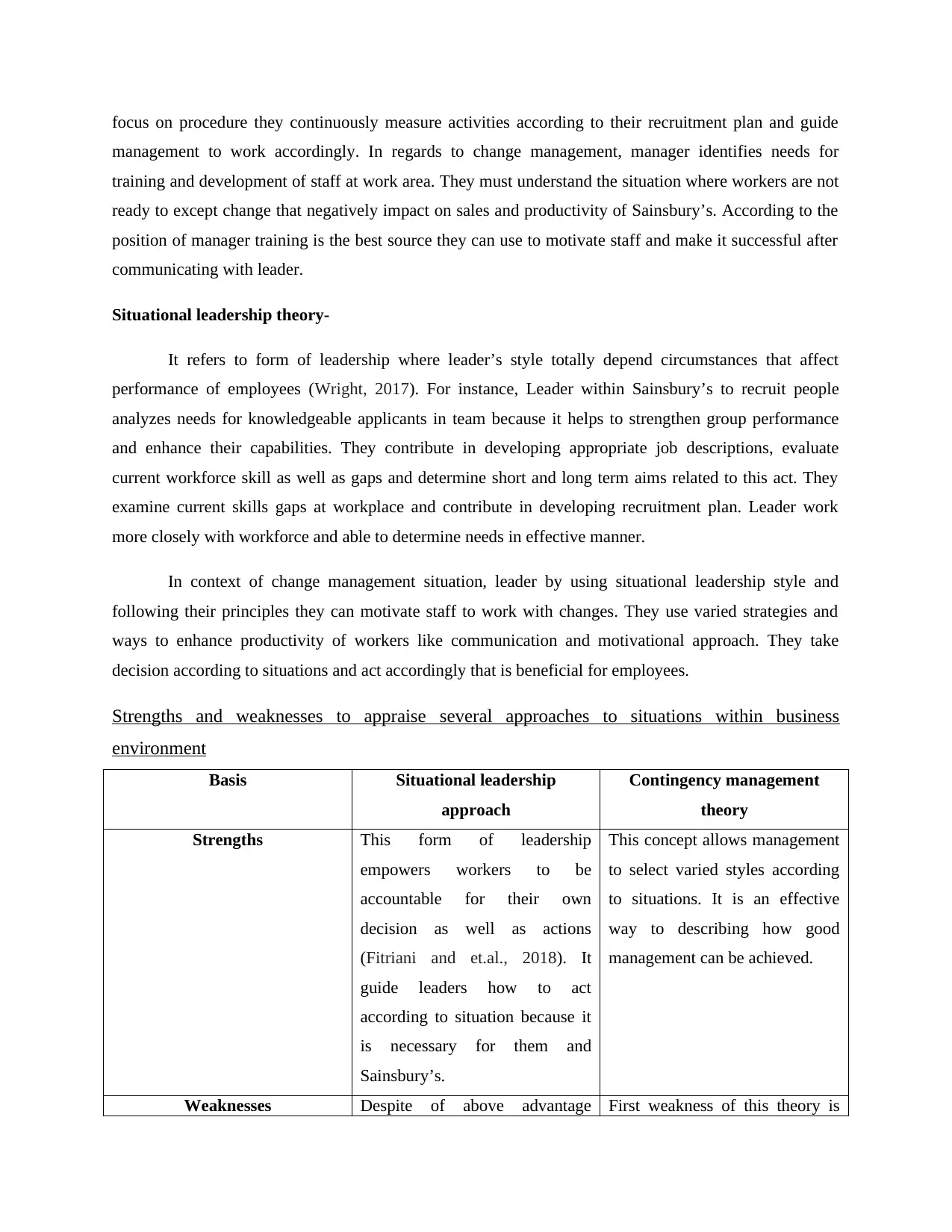
focus on procedure they continuously measure activities according to their recruitment plan and guide
management to work accordingly. In regards to change management, manager identifies needs for
training and development of staff at work area. They must understand the situation where workers are not
ready to except change that negatively impact on sales and productivity of Sainsbury’s. According to the
position of manager training is the best source they can use to motivate staff and make it successful after
communicating with leader.
Situational leadership theory-
It refers to form of leadership where leader’s style totally depend circumstances that affect
performance of employees (Wright, 2017). For instance, Leader within Sainsbury’s to recruit people
analyzes needs for knowledgeable applicants in team because it helps to strengthen group performance
and enhance their capabilities. They contribute in developing appropriate job descriptions, evaluate
current workforce skill as well as gaps and determine short and long term aims related to this act. They
examine current skills gaps at workplace and contribute in developing recruitment plan. Leader work
more closely with workforce and able to determine needs in effective manner.
In context of change management situation, leader by using situational leadership style and
following their principles they can motivate staff to work with changes. They use varied strategies and
ways to enhance productivity of workers like communication and motivational approach. They take
decision according to situations and act accordingly that is beneficial for employees.
Strengths and weaknesses to appraise several approaches to situations within business
environment
Basis Situational leadership
approach
Contingency management
theory
Strengths This form of leadership
empowers workers to be
accountable for their own
decision as well as actions
(Fitriani and et.al., 2018). It
guide leaders how to act
according to situation because it
is necessary for them and
Sainsbury’s.
This concept allows management
to select varied styles according
to situations. It is an effective
way to describing how good
management can be achieved.
Weaknesses Despite of above advantage First weakness of this theory is
management to work accordingly. In regards to change management, manager identifies needs for
training and development of staff at work area. They must understand the situation where workers are not
ready to except change that negatively impact on sales and productivity of Sainsbury’s. According to the
position of manager training is the best source they can use to motivate staff and make it successful after
communicating with leader.
Situational leadership theory-
It refers to form of leadership where leader’s style totally depend circumstances that affect
performance of employees (Wright, 2017). For instance, Leader within Sainsbury’s to recruit people
analyzes needs for knowledgeable applicants in team because it helps to strengthen group performance
and enhance their capabilities. They contribute in developing appropriate job descriptions, evaluate
current workforce skill as well as gaps and determine short and long term aims related to this act. They
examine current skills gaps at workplace and contribute in developing recruitment plan. Leader work
more closely with workforce and able to determine needs in effective manner.
In context of change management situation, leader by using situational leadership style and
following their principles they can motivate staff to work with changes. They use varied strategies and
ways to enhance productivity of workers like communication and motivational approach. They take
decision according to situations and act accordingly that is beneficial for employees.
Strengths and weaknesses to appraise several approaches to situations within business
environment
Basis Situational leadership
approach
Contingency management
theory
Strengths This form of leadership
empowers workers to be
accountable for their own
decision as well as actions
(Fitriani and et.al., 2018). It
guide leaders how to act
according to situation because it
is necessary for them and
Sainsbury’s.
This concept allows management
to select varied styles according
to situations. It is an effective
way to describing how good
management can be achieved.
Weaknesses Despite of above advantage First weakness of this theory is
Paraphrase This Document
Need a fresh take? Get an instant paraphrase of this document with our AI Paraphraser
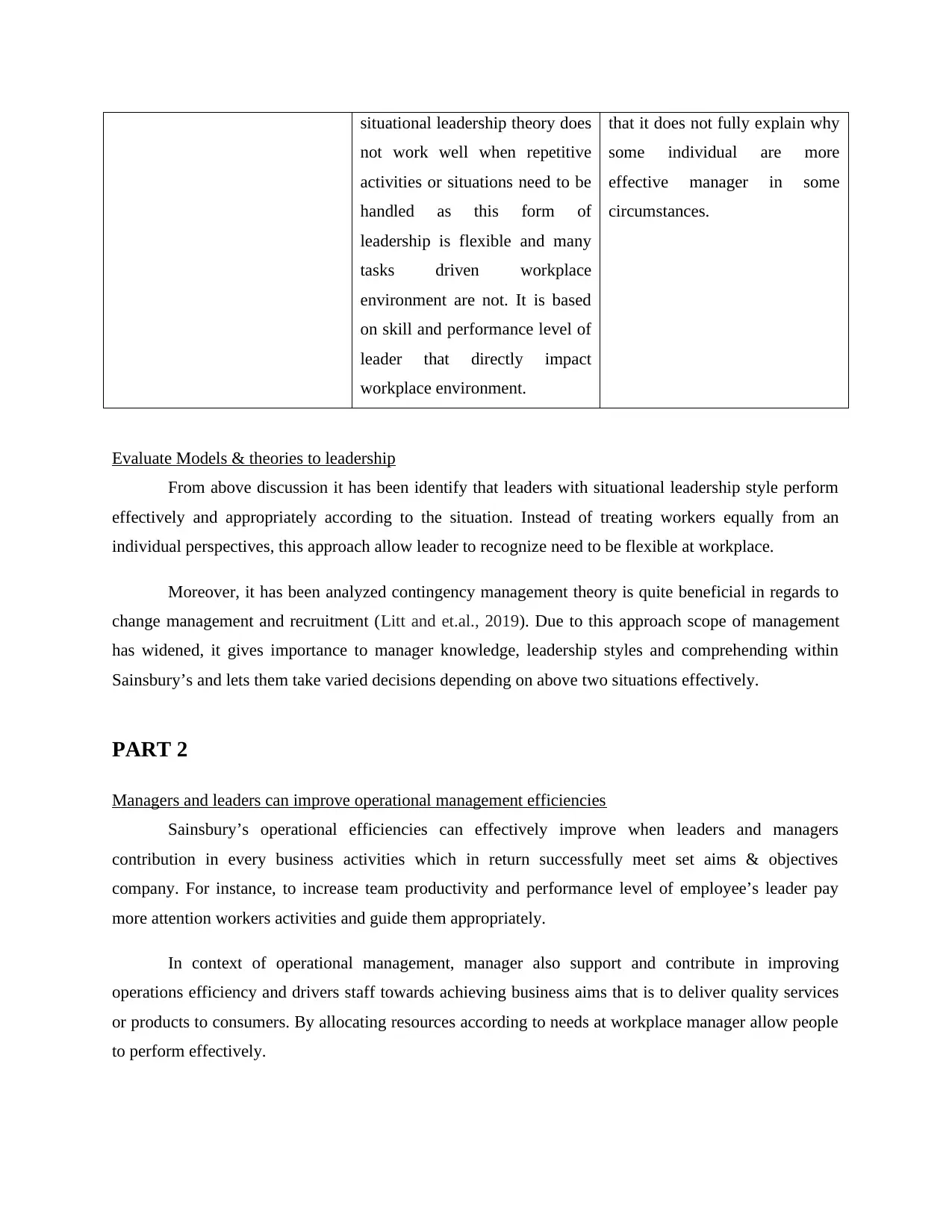
situational leadership theory does
not work well when repetitive
activities or situations need to be
handled as this form of
leadership is flexible and many
tasks driven workplace
environment are not. It is based
on skill and performance level of
leader that directly impact
workplace environment.
that it does not fully explain why
some individual are more
effective manager in some
circumstances.
Evaluate Models & theories to leadership
From above discussion it has been identify that leaders with situational leadership style perform
effectively and appropriately according to the situation. Instead of treating workers equally from an
individual perspectives, this approach allow leader to recognize need to be flexible at workplace.
Moreover, it has been analyzed contingency management theory is quite beneficial in regards to
change management and recruitment (Litt and et.al., 2019). Due to this approach scope of management
has widened, it gives importance to manager knowledge, leadership styles and comprehending within
Sainsbury’s and lets them take varied decisions depending on above two situations effectively.
PART 2
Managers and leaders can improve operational management efficiencies
Sainsbury’s operational efficiencies can effectively improve when leaders and managers
contribution in every business activities which in return successfully meet set aims & objectives
company. For instance, to increase team productivity and performance level of employee’s leader pay
more attention workers activities and guide them appropriately.
In context of operational management, manager also support and contribute in improving
operations efficiency and drivers staff towards achieving business aims that is to deliver quality services
or products to consumers. By allocating resources according to needs at workplace manager allow people
to perform effectively.
not work well when repetitive
activities or situations need to be
handled as this form of
leadership is flexible and many
tasks driven workplace
environment are not. It is based
on skill and performance level of
leader that directly impact
workplace environment.
that it does not fully explain why
some individual are more
effective manager in some
circumstances.
Evaluate Models & theories to leadership
From above discussion it has been identify that leaders with situational leadership style perform
effectively and appropriately according to the situation. Instead of treating workers equally from an
individual perspectives, this approach allow leader to recognize need to be flexible at workplace.
Moreover, it has been analyzed contingency management theory is quite beneficial in regards to
change management and recruitment (Litt and et.al., 2019). Due to this approach scope of management
has widened, it gives importance to manager knowledge, leadership styles and comprehending within
Sainsbury’s and lets them take varied decisions depending on above two situations effectively.
PART 2
Managers and leaders can improve operational management efficiencies
Sainsbury’s operational efficiencies can effectively improve when leaders and managers
contribution in every business activities which in return successfully meet set aims & objectives
company. For instance, to increase team productivity and performance level of employee’s leader pay
more attention workers activities and guide them appropriately.
In context of operational management, manager also support and contribute in improving
operations efficiency and drivers staff towards achieving business aims that is to deliver quality services
or products to consumers. By allocating resources according to needs at workplace manager allow people
to perform effectively.
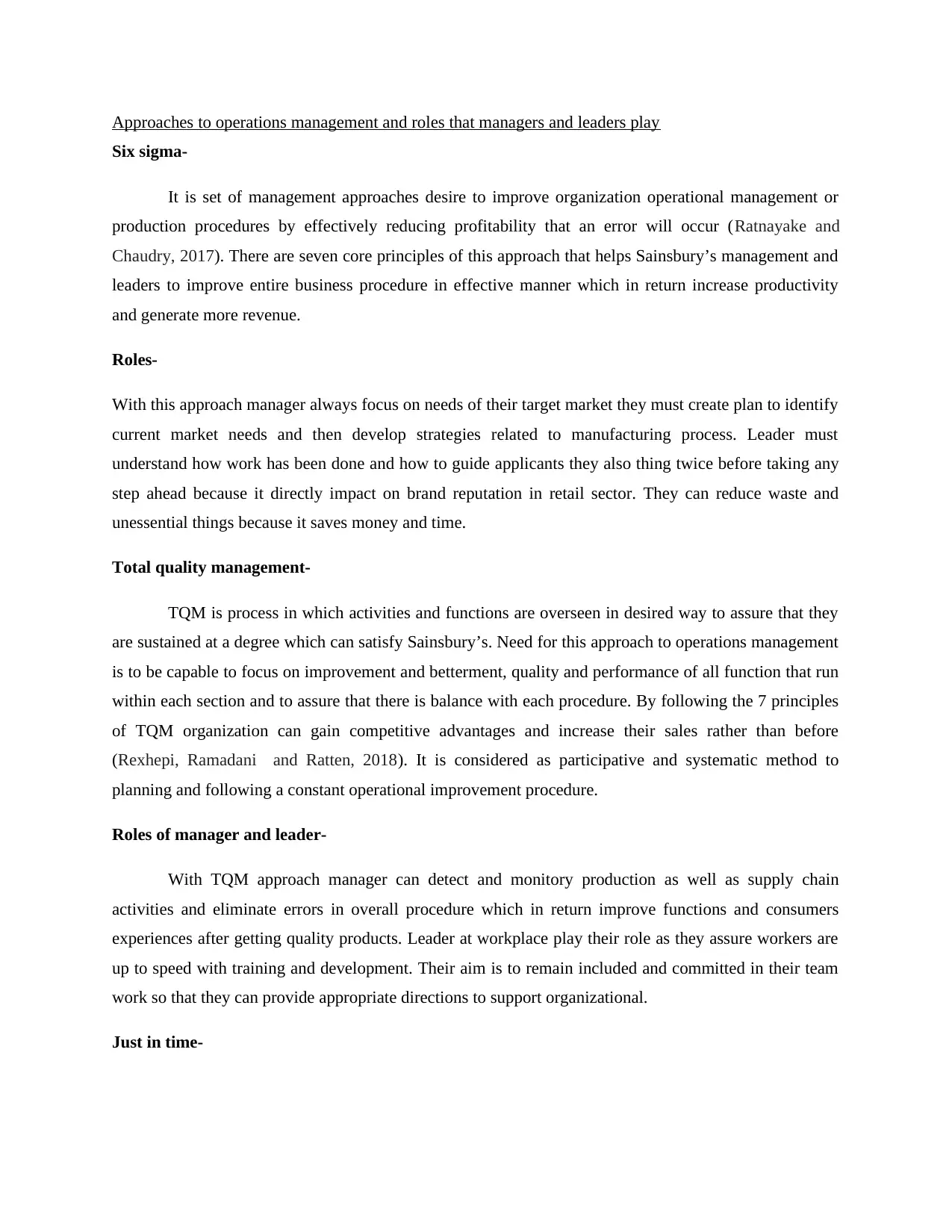
Approaches to operations management and roles that managers and leaders play
Six sigma-
It is set of management approaches desire to improve organization operational management or
production procedures by effectively reducing profitability that an error will occur (Ratnayake and
Chaudry, 2017). There are seven core principles of this approach that helps Sainsbury’s management and
leaders to improve entire business procedure in effective manner which in return increase productivity
and generate more revenue.
Roles-
With this approach manager always focus on needs of their target market they must create plan to identify
current market needs and then develop strategies related to manufacturing process. Leader must
understand how work has been done and how to guide applicants they also thing twice before taking any
step ahead because it directly impact on brand reputation in retail sector. They can reduce waste and
unessential things because it saves money and time.
Total quality management-
TQM is process in which activities and functions are overseen in desired way to assure that they
are sustained at a degree which can satisfy Sainsbury’s. Need for this approach to operations management
is to be capable to focus on improvement and betterment, quality and performance of all function that run
within each section and to assure that there is balance with each procedure. By following the 7 principles
of TQM organization can gain competitive advantages and increase their sales rather than before
(Rexhepi, Ramadani and Ratten, 2018). It is considered as participative and systematic method to
planning and following a constant operational improvement procedure.
Roles of manager and leader-
With TQM approach manager can detect and monitory production as well as supply chain
activities and eliminate errors in overall procedure which in return improve functions and consumers
experiences after getting quality products. Leader at workplace play their role as they assure workers are
up to speed with training and development. Their aim is to remain included and committed in their team
work so that they can provide appropriate directions to support organizational.
Just in time-
Six sigma-
It is set of management approaches desire to improve organization operational management or
production procedures by effectively reducing profitability that an error will occur (Ratnayake and
Chaudry, 2017). There are seven core principles of this approach that helps Sainsbury’s management and
leaders to improve entire business procedure in effective manner which in return increase productivity
and generate more revenue.
Roles-
With this approach manager always focus on needs of their target market they must create plan to identify
current market needs and then develop strategies related to manufacturing process. Leader must
understand how work has been done and how to guide applicants they also thing twice before taking any
step ahead because it directly impact on brand reputation in retail sector. They can reduce waste and
unessential things because it saves money and time.
Total quality management-
TQM is process in which activities and functions are overseen in desired way to assure that they
are sustained at a degree which can satisfy Sainsbury’s. Need for this approach to operations management
is to be capable to focus on improvement and betterment, quality and performance of all function that run
within each section and to assure that there is balance with each procedure. By following the 7 principles
of TQM organization can gain competitive advantages and increase their sales rather than before
(Rexhepi, Ramadani and Ratten, 2018). It is considered as participative and systematic method to
planning and following a constant operational improvement procedure.
Roles of manager and leader-
With TQM approach manager can detect and monitory production as well as supply chain
activities and eliminate errors in overall procedure which in return improve functions and consumers
experiences after getting quality products. Leader at workplace play their role as they assure workers are
up to speed with training and development. Their aim is to remain included and committed in their team
work so that they can provide appropriate directions to support organizational.
Just in time-
⊘ This is a preview!⊘
Do you want full access?
Subscribe today to unlock all pages.

Trusted by 1+ million students worldwide
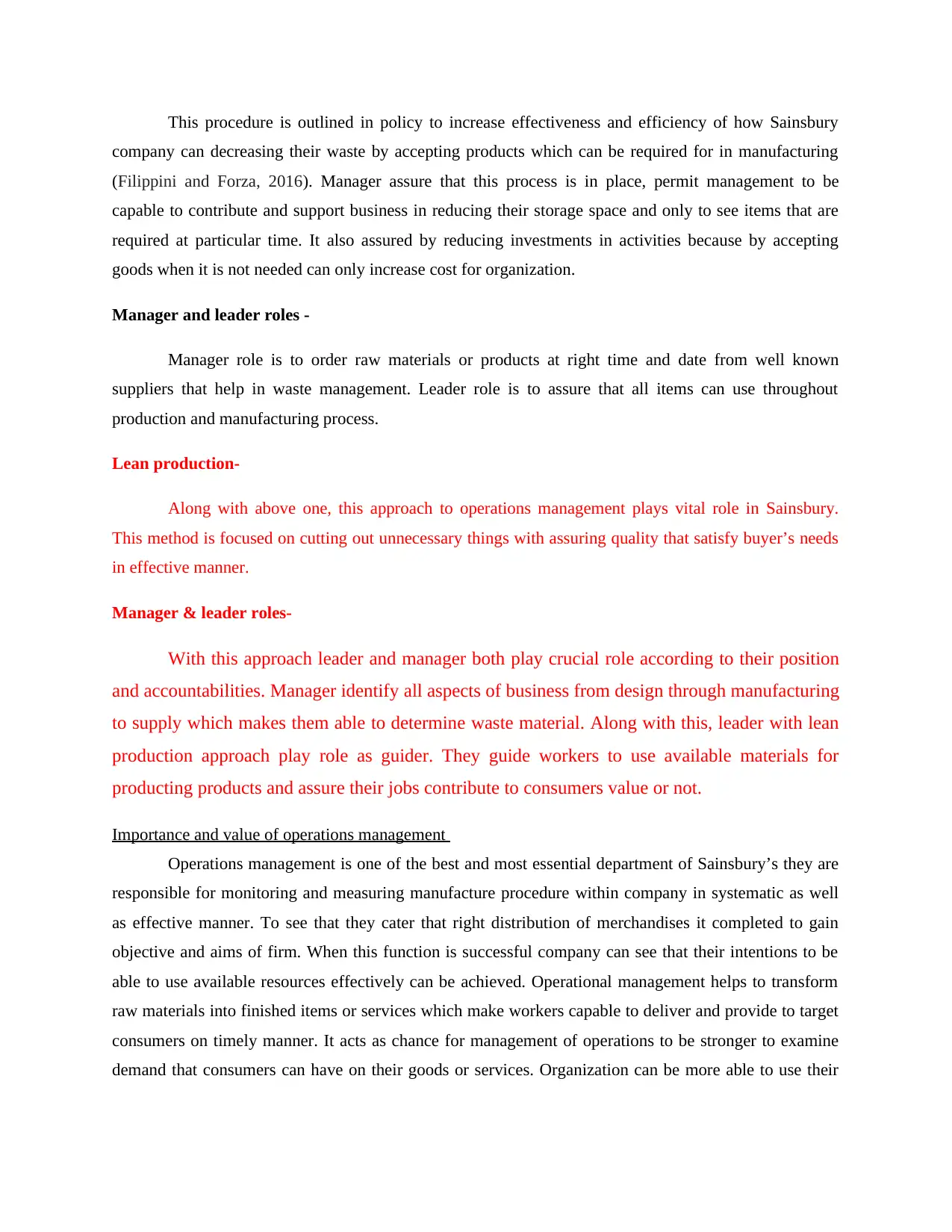
This procedure is outlined in policy to increase effectiveness and efficiency of how Sainsbury
company can decreasing their waste by accepting products which can be required for in manufacturing
(Filippini and Forza, 2016). Manager assure that this process is in place, permit management to be
capable to contribute and support business in reducing their storage space and only to see items that are
required at particular time. It also assured by reducing investments in activities because by accepting
goods when it is not needed can only increase cost for organization.
Manager and leader roles -
Manager role is to order raw materials or products at right time and date from well known
suppliers that help in waste management. Leader role is to assure that all items can use throughout
production and manufacturing process.
Lean production-
Along with above one, this approach to operations management plays vital role in Sainsbury.
This method is focused on cutting out unnecessary things with assuring quality that satisfy buyer’s needs
in effective manner.
Manager & leader roles-
With this approach leader and manager both play crucial role according to their position
and accountabilities. Manager identify all aspects of business from design through manufacturing
to supply which makes them able to determine waste material. Along with this, leader with lean
production approach play role as guider. They guide workers to use available materials for
producting products and assure their jobs contribute to consumers value or not.
Importance and value of operations management
Operations management is one of the best and most essential department of Sainsbury’s they are
responsible for monitoring and measuring manufacture procedure within company in systematic as well
as effective manner. To see that they cater that right distribution of merchandises it completed to gain
objective and aims of firm. When this function is successful company can see that their intentions to be
able to use available resources effectively can be achieved. Operational management helps to transform
raw materials into finished items or services which make workers capable to deliver and provide to target
consumers on timely manner. It acts as chance for management of operations to be stronger to examine
demand that consumers can have on their goods or services. Organization can be more able to use their
company can decreasing their waste by accepting products which can be required for in manufacturing
(Filippini and Forza, 2016). Manager assure that this process is in place, permit management to be
capable to contribute and support business in reducing their storage space and only to see items that are
required at particular time. It also assured by reducing investments in activities because by accepting
goods when it is not needed can only increase cost for organization.
Manager and leader roles -
Manager role is to order raw materials or products at right time and date from well known
suppliers that help in waste management. Leader role is to assure that all items can use throughout
production and manufacturing process.
Lean production-
Along with above one, this approach to operations management plays vital role in Sainsbury.
This method is focused on cutting out unnecessary things with assuring quality that satisfy buyer’s needs
in effective manner.
Manager & leader roles-
With this approach leader and manager both play crucial role according to their position
and accountabilities. Manager identify all aspects of business from design through manufacturing
to supply which makes them able to determine waste material. Along with this, leader with lean
production approach play role as guider. They guide workers to use available materials for
producting products and assure their jobs contribute to consumers value or not.
Importance and value of operations management
Operations management is one of the best and most essential department of Sainsbury’s they are
responsible for monitoring and measuring manufacture procedure within company in systematic as well
as effective manner. To see that they cater that right distribution of merchandises it completed to gain
objective and aims of firm. When this function is successful company can see that their intentions to be
able to use available resources effectively can be achieved. Operational management helps to transform
raw materials into finished items or services which make workers capable to deliver and provide to target
consumers on timely manner. It acts as chance for management of operations to be stronger to examine
demand that consumers can have on their goods or services. Organization can be more able to use their
Paraphrase This Document
Need a fresh take? Get an instant paraphrase of this document with our AI Paraphraser
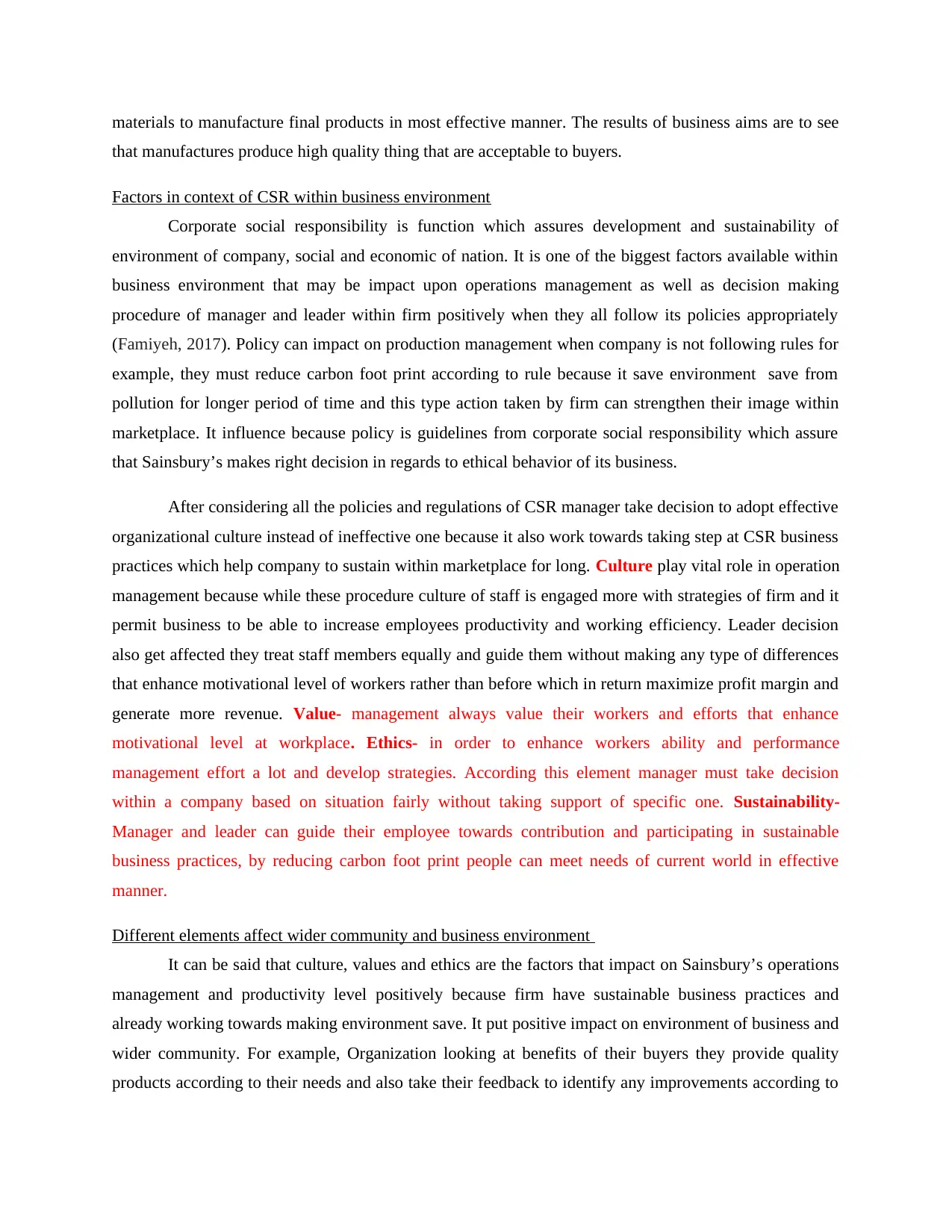
materials to manufacture final products in most effective manner. The results of business aims are to see
that manufactures produce high quality thing that are acceptable to buyers.
Factors in context of CSR within business environment
Corporate social responsibility is function which assures development and sustainability of
environment of company, social and economic of nation. It is one of the biggest factors available within
business environment that may be impact upon operations management as well as decision making
procedure of manager and leader within firm positively when they all follow its policies appropriately
(Famiyeh, 2017). Policy can impact on production management when company is not following rules for
example, they must reduce carbon foot print according to rule because it save environment save from
pollution for longer period of time and this type action taken by firm can strengthen their image within
marketplace. It influence because policy is guidelines from corporate social responsibility which assure
that Sainsbury’s makes right decision in regards to ethical behavior of its business.
After considering all the policies and regulations of CSR manager take decision to adopt effective
organizational culture instead of ineffective one because it also work towards taking step at CSR business
practices which help company to sustain within marketplace for long. Culture play vital role in operation
management because while these procedure culture of staff is engaged more with strategies of firm and it
permit business to be able to increase employees productivity and working efficiency. Leader decision
also get affected they treat staff members equally and guide them without making any type of differences
that enhance motivational level of workers rather than before which in return maximize profit margin and
generate more revenue. Value- management always value their workers and efforts that enhance
motivational level at workplace. Ethics- in order to enhance workers ability and performance
management effort a lot and develop strategies. According this element manager must take decision
within a company based on situation fairly without taking support of specific one. Sustainability-
Manager and leader can guide their employee towards contribution and participating in sustainable
business practices, by reducing carbon foot print people can meet needs of current world in effective
manner.
Different elements affect wider community and business environment
It can be said that culture, values and ethics are the factors that impact on Sainsbury’s operations
management and productivity level positively because firm have sustainable business practices and
already working towards making environment save. It put positive impact on environment of business and
wider community. For example, Organization looking at benefits of their buyers they provide quality
products according to their needs and also take their feedback to identify any improvements according to
that manufactures produce high quality thing that are acceptable to buyers.
Factors in context of CSR within business environment
Corporate social responsibility is function which assures development and sustainability of
environment of company, social and economic of nation. It is one of the biggest factors available within
business environment that may be impact upon operations management as well as decision making
procedure of manager and leader within firm positively when they all follow its policies appropriately
(Famiyeh, 2017). Policy can impact on production management when company is not following rules for
example, they must reduce carbon foot print according to rule because it save environment save from
pollution for longer period of time and this type action taken by firm can strengthen their image within
marketplace. It influence because policy is guidelines from corporate social responsibility which assure
that Sainsbury’s makes right decision in regards to ethical behavior of its business.
After considering all the policies and regulations of CSR manager take decision to adopt effective
organizational culture instead of ineffective one because it also work towards taking step at CSR business
practices which help company to sustain within marketplace for long. Culture play vital role in operation
management because while these procedure culture of staff is engaged more with strategies of firm and it
permit business to be able to increase employees productivity and working efficiency. Leader decision
also get affected they treat staff members equally and guide them without making any type of differences
that enhance motivational level of workers rather than before which in return maximize profit margin and
generate more revenue. Value- management always value their workers and efforts that enhance
motivational level at workplace. Ethics- in order to enhance workers ability and performance
management effort a lot and develop strategies. According this element manager must take decision
within a company based on situation fairly without taking support of specific one. Sustainability-
Manager and leader can guide their employee towards contribution and participating in sustainable
business practices, by reducing carbon foot print people can meet needs of current world in effective
manner.
Different elements affect wider community and business environment
It can be said that culture, values and ethics are the factors that impact on Sainsbury’s operations
management and productivity level positively because firm have sustainable business practices and
already working towards making environment save. It put positive impact on environment of business and
wider community. For example, Organization looking at benefits of their buyers they provide quality
products according to their needs and also take their feedback to identify any improvements according to
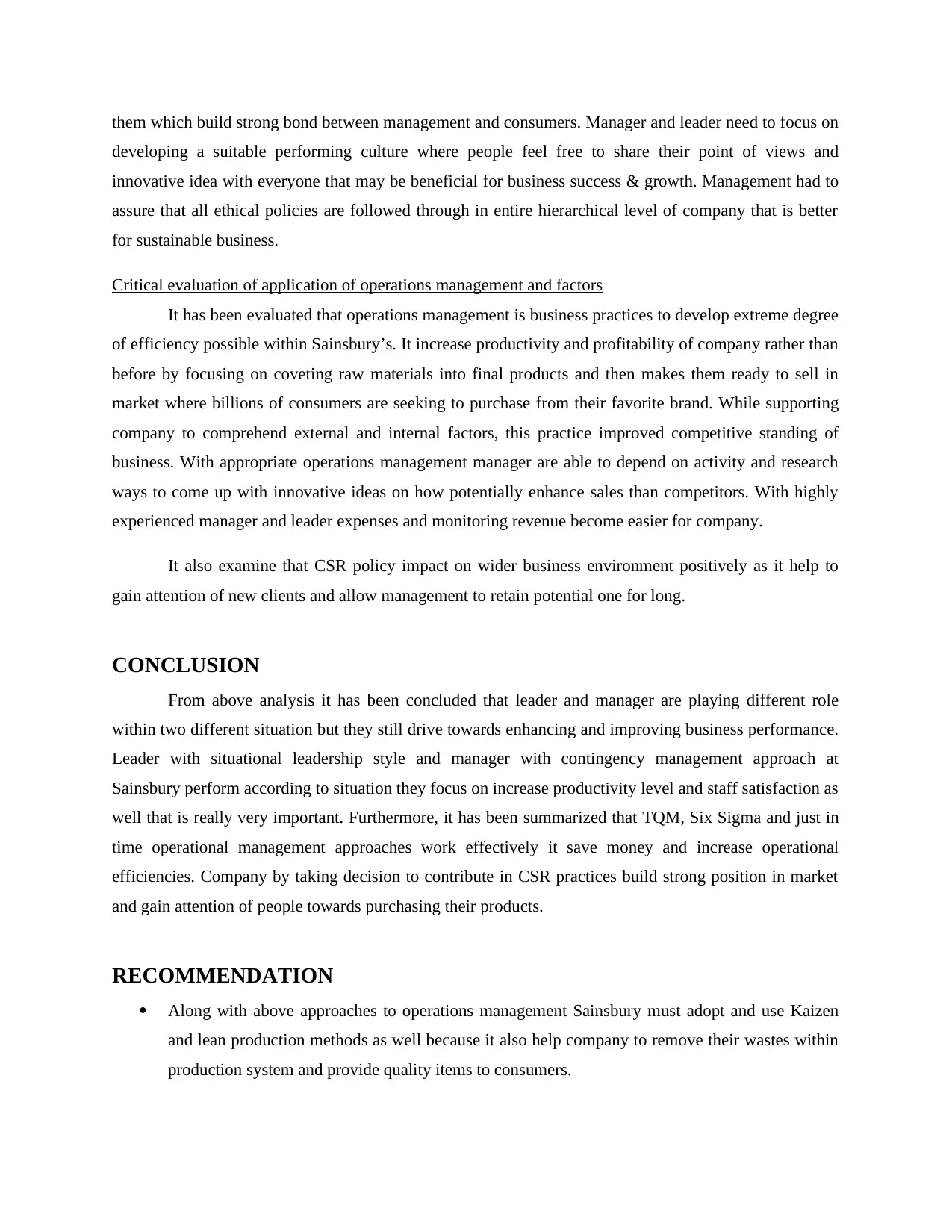
them which build strong bond between management and consumers. Manager and leader need to focus on
developing a suitable performing culture where people feel free to share their point of views and
innovative idea with everyone that may be beneficial for business success & growth. Management had to
assure that all ethical policies are followed through in entire hierarchical level of company that is better
for sustainable business.
Critical evaluation of application of operations management and factors
It has been evaluated that operations management is business practices to develop extreme degree
of efficiency possible within Sainsbury’s. It increase productivity and profitability of company rather than
before by focusing on coveting raw materials into final products and then makes them ready to sell in
market where billions of consumers are seeking to purchase from their favorite brand. While supporting
company to comprehend external and internal factors, this practice improved competitive standing of
business. With appropriate operations management manager are able to depend on activity and research
ways to come up with innovative ideas on how potentially enhance sales than competitors. With highly
experienced manager and leader expenses and monitoring revenue become easier for company.
It also examine that CSR policy impact on wider business environment positively as it help to
gain attention of new clients and allow management to retain potential one for long.
CONCLUSION
From above analysis it has been concluded that leader and manager are playing different role
within two different situation but they still drive towards enhancing and improving business performance.
Leader with situational leadership style and manager with contingency management approach at
Sainsbury perform according to situation they focus on increase productivity level and staff satisfaction as
well that is really very important. Furthermore, it has been summarized that TQM, Six Sigma and just in
time operational management approaches work effectively it save money and increase operational
efficiencies. Company by taking decision to contribute in CSR practices build strong position in market
and gain attention of people towards purchasing their products.
RECOMMENDATION
Along with above approaches to operations management Sainsbury must adopt and use Kaizen
and lean production methods as well because it also help company to remove their wastes within
production system and provide quality items to consumers.
developing a suitable performing culture where people feel free to share their point of views and
innovative idea with everyone that may be beneficial for business success & growth. Management had to
assure that all ethical policies are followed through in entire hierarchical level of company that is better
for sustainable business.
Critical evaluation of application of operations management and factors
It has been evaluated that operations management is business practices to develop extreme degree
of efficiency possible within Sainsbury’s. It increase productivity and profitability of company rather than
before by focusing on coveting raw materials into final products and then makes them ready to sell in
market where billions of consumers are seeking to purchase from their favorite brand. While supporting
company to comprehend external and internal factors, this practice improved competitive standing of
business. With appropriate operations management manager are able to depend on activity and research
ways to come up with innovative ideas on how potentially enhance sales than competitors. With highly
experienced manager and leader expenses and monitoring revenue become easier for company.
It also examine that CSR policy impact on wider business environment positively as it help to
gain attention of new clients and allow management to retain potential one for long.
CONCLUSION
From above analysis it has been concluded that leader and manager are playing different role
within two different situation but they still drive towards enhancing and improving business performance.
Leader with situational leadership style and manager with contingency management approach at
Sainsbury perform according to situation they focus on increase productivity level and staff satisfaction as
well that is really very important. Furthermore, it has been summarized that TQM, Six Sigma and just in
time operational management approaches work effectively it save money and increase operational
efficiencies. Company by taking decision to contribute in CSR practices build strong position in market
and gain attention of people towards purchasing their products.
RECOMMENDATION
Along with above approaches to operations management Sainsbury must adopt and use Kaizen
and lean production methods as well because it also help company to remove their wastes within
production system and provide quality items to consumers.
⊘ This is a preview!⊘
Do you want full access?
Subscribe today to unlock all pages.

Trusted by 1+ million students worldwide
1 out of 14
Related Documents
Your All-in-One AI-Powered Toolkit for Academic Success.
+13062052269
info@desklib.com
Available 24*7 on WhatsApp / Email
![[object Object]](/_next/static/media/star-bottom.7253800d.svg)
Unlock your academic potential
Copyright © 2020–2026 A2Z Services. All Rights Reserved. Developed and managed by ZUCOL.





